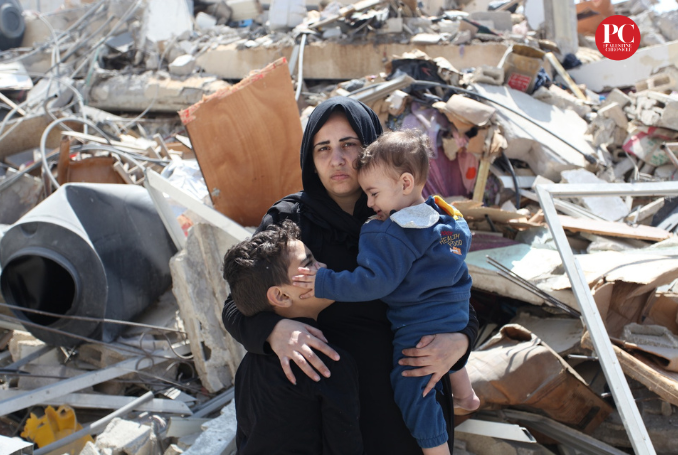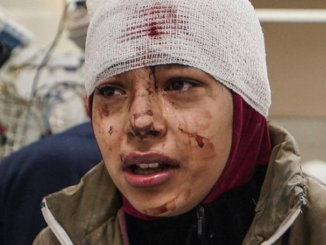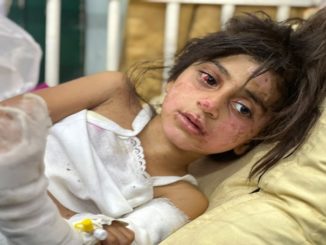
“After more than 11 months of war, an estimated 177,000 women face life-threatening health risks.”
Some 15,000 pregnant women are “on the brink of famine” in the besieged Gaza Strip, as thousands of women facing life-threatening health risks, UN Women have warned.
“According to the United Nations Population Fund, among 155,000 pregnant women and new mothers in Gaza, 15,000 pregnant women are on the brink of famine,” the report titled Gaza: A War on Women’s Health states.
It provides a comprehensive analysis of the health crisis women face during the conflict since October 7, and draws on interviews and surveys conducted across Gaza to highlight the intersection of gender, health, and conflict.
The alert explored how the conflict has affected women’s physical and mental health and was intended to support evidence-based advocacy and services.
“Nearly 84 per cent of health facility buildings have been destroyed or damaged, and those remaining in service lack medicines, ambulances, basic life-saving treatment, electricity, and water,” the report detailed.
Public Health Crisis
It stated that the war has caused a catastrophic public health crisis, leading to a spike in preventable deaths, the rapid spread of diseases, and high rates of physical and mental illnesses.
UN Women has released a report on the situation in Gaza titled “Gaza: A War on Women’s Health.”
The report provides a comprehensive analysis of the health sector crisis in Gaza and examines its impact on the physical and mental health of women after more than 11 months of… pic.twitter.com/DbBIoNT4Dj
— Quds News Network (@QudsNen) September 30, 2024
“After more than 11 months of war, an estimated 177,000 women face life-threatening health risks, including from non-communicable diseases and hunger and poor nutrition during pregnancy,” the report concluded.
An estimated 155,000 pregnant and breastfeeding women confront obstacles to antenatal and postnatal care.
Among pregnant women interviewed, almost all experienced challenges related to nutrition, with “some 69 per cent having experienced complications such as urinary tract infections, anaemia, pre-term labour and hypertensive disorders.”
More than 162,000 women suffer from or are at risk of non-communicable diseases (NCDs) such as hypertension, diabetes mellitus, cardiovascular disease and cancer.
“Women,in particular older women, in Gaza have historically been at a higher risk of NCDs,” according to the data provided.
Cancer Patients
There are over 30,841 women at risk of diabetes, 107,443 women at risk of hypertension, 18,583 women at risk of cardiovascular diseases, and 5,201 women with cancer.”
Long, brutal months of war have brought Gaza's health system to the brink of collapse.
Women:
? report higher rates of medical conditions needing immediate response
? face heightened risks of communicable diseases#Gaza: A War on Women’s Health report: https://t.co/zjFb3fXd9R pic.twitter.com/IBhw9BqIF3— UN Women (@UN_Women) September 19, 2024
The survey found that more than 5,000 female cancer patients need immediate treatment, but all services have been suspended.
“Too many women in Gaza are at risk of dying from medical complications after months without any medication, limited access to doctors and no treatment for serious illnesses like diabetes or cancer,” said UN Women’s Regional Director for Arab States, Moez Doraid.
“It is imperative that we act swiftly to save their lives. An immediate and sustainable ceasefire, the release of all hostages, the provision of safe, unimpeded humanitarian aid, and access to medicines and health services throughout Gaza are essential to prevent further deterioration,” Doraid added.
Overcrowding and Insufficient Water
Severe overcrowding in shelters and insufficient water and sanitation “have led to hundreds of thousands of cases of acute respiratory infections, jaundice, diarrhoea and skin rashes.”
Women and girls, UN Women found, face a heightened risk of exposure due to their disproportionate role in caring for sick family members.
Twice as many women as men reported having skin infections, and women accounted for more than two-thirds of cases of gastrointestinal diseases and Hepatitis A.
(PC, MEMO)








